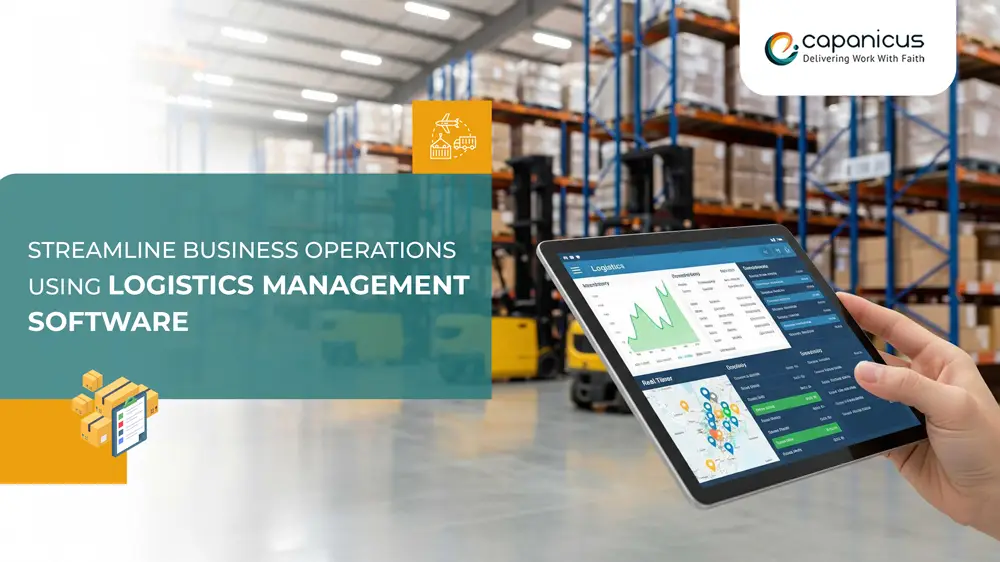
Businesses associated with supply chains face the challenge of running their operations efficiently and profitably, while providing satisfactory services to customers and keeping their costs low. This is a comprehensive and complex challenge involving various aspects. These include customer order processing, inventory control and management, warehousing, packaging, handling of materials, transportation, and identification and resolution of risks.
Managing these aspects of supply chain operations manually has limitations, including human errors, inefficiency, and higher labor costs. These limitations can further lead to various undesired business outcomes. They can include the difficulty in scaling operations with the growth of the business, overstocking or stockouts, and high operational costs. Other outcomes can be the difficulty in keeping up with changing customer and market demands, and loss of competitive edge.
Businesses related to supply chains can ill afford such undesired outcomes if they have to continue doing business, profit, and growing.
To efficiently and effectively perform and manage their various tasks and operations and to avoid unfavorable business outcomes altogether, these businesses should opt for digital transformation. This includes adopting digital technology-based solutions such as Logistics Management Software.
The logistics business management software is a digital-based solution for various businesses associated with supply chains. These include manufacturers, distributors, suppliers, and transportation and logistics service providers, including shipping companies and truckers. Other related businesses can include retailers, warehousing and fulfillment services, inventory management solution providers, and others.
Let’s know more about a logistics business management software solution.
What is Logistics Management Software?
A logistics management software is a software system solution that improves optimization, management, and streamlining of various processes related to logistics and supply chains. It is an advanced digital technology-based solution that helps to ensure an efficient and effective workflow system. This software is also referred to as supply chain logistics software or simply logistics software. It is equipped with various functionalities, including customer order, warehouse, and inventory management. The other involved functionalities are freight management and transportation management.
Logistics management software is used by businesses and organizations that deal with performing logistics-related operations. It enables them to gain clear visibility and control over the movement of materials and goods. Moreover, the software lets them share information between various stakeholders. This particular software provides useful features and tools that enable the involved businesses to make data-guided decisions regarding planning, implementation, and monitoring of logistics-centered activities.
To be more specific, the logistics business management software benefits from location-centered services to optimize delivery and distribution routes, track shipments, and fulfill orders. Moreover, it utilizes location-based services for managing carriers, optimizing warehouse operations, forecasting demand, and generating reports based on analysis of data.
A logistics software may be cloud-operated or on-premises, or it may be a combination of these two modes. Moreover, the software can be integrated with other systems being used by businesses. These may include Customer Relationship Management Systems and Transport Management Systems, as well as Enterprise Resource Planning Systems.
What particular functions are performed by logistics software?
Here are various functions performed by logistics management software to streamline supply chain operations.
- Order Management
The software performs various responsibilities involved with sales channels. These include managing, prioritizing, and tracking incoming orders and dealing with back orders. Moreover, they include managing invoices and shipments and integrating shipping details. The other responsibilities include identifying errors, scheduling deliveries, and doing other similar tasks.
Performing manual entry of orders consumes a lot of time and is prone to errors. But with logistics software, orders can be easily and automatically entered into the system from various sales channels. These include e-commerce platforms and point-of-sale systems.
The logistics software helps quicken the processing of orders from customers in various ways. These include performing automation of manual processes, enhancing accuracy, reducing errors, and slashing down time incurred in data entry, fulfillment, and delivery of orders.
- Inventory Management
This software enables businesses to streamline the management of their inventories by enabling them to efficiently manage their various item inventories at different locations or warehouses. It lets them effortlessly measure and track their stock levels. Moreover, the software enables businesses to perform an evaluation of the quantity and quality of various stocked products and track their shipments precisely. As businesses can access and analyze precise inventory-related data, they can make data-informed decisions for making their goods purchasing and restocking strategies better..
The LMS helps them maintain an optimum quantity of products to fulfill the demands of customers and avoid any occurrences of stock-outs or overstocking of goods. It also helps them lower their inventory management-related costs.
- Warehouse Management
Warehouse management is responsible for improving organization, control, optimization, and management of various warehouse-associated operations and processes. The software enables businesses to achieve streamlined inventory control and automation of order fulfillment-related activities, including picking, packing, and shipping.
Warehouse management also involves the optimization of space where goods are stored. Moreover, it concerns the management of warehouse-related labour and integration with other business systems such as barcode scanners.
For warehouse management, the logistics management software delivers real-time inventory updates and simplifies picking and packing-related operations. Moreover, it helps to ensure efficient coordination between storage and delivery. This enables businesses to achieve real-time visibility over orders, reduce delays, make fast deliveries, and lessen loading times.
- Transportation Management
The logistics software helps in the effective and efficient management of all activities related to the movement of goods. This includes offering support for choosing carriers and scheduling, and routing and tracking of shipments. It also helps manage freight rates and optimize transportation routes. Moreover, the software enables the creation and management of shipment-related documents digitally.
The LMS enables businesses to achieve optimization of routes with the help of route optimization algorithms, real-time data implementation, and the management of fleets. Moreover, the software helps businesses consolidate and manage loads and provides them with data visualization and mapping-related capabilities. Furthermore, the software produces insightful analytics and reports automatically and performs integrations with other systems being used by businesses.
The software helps businesses achieve effective resource management and provides them with real-time updates through the use of mobile apps and Global Positioning System technology. It provides precise information about driver locations and directions for full visibility across logistics operations. The software brings down manual errors and enables seamless coordination between various stakeholders. These include drivers, dispatchers, customers, transportation providers, logistics providers, and others. Thus, the software plays a vital role in making the overall transportation system more efficient.
It promotes driver safety by tracking various activities of drivers. This includes the use of cell phones during driving, the number of breaks being taken, the speed of vehicles, and the observance of traffic rules. Based on the created reports, businesses can take actions to improve drivers’ safety.
The GPS capability of LMS software enables drivers to choose the shortest and safest route for the customers. This ensures enhanced goods safety, improved customer satisfaction, and slashes operational and fuel-related costs. Moreover, this results in enhanced operational efficiency and improved transparency for customers. Furthermore, this leads to on-time order deliveries and reduced delivery times. The software’s use thus helps to enhance the sustainability and profitability of the supply chain businesses.
- Reporting and Data-Driven Decision Making
The logistics management software contains powerful analytics and reporting features, which consist of maps, graphs, and dashboards. They provide businesses with insightful information on various key performance indicators (KPIs). Moreover, the features let businesses track various key metrics. These include order accuracy rates, customer order cycle time, inventory turnover ratios, and supply chain cycle time, as well as on-time delivery rates.
This information enables businesses to visualize transportation-associated trends. It also enables businesses to evaluate and recognize any bottlenecks and areas of improvement and inefficiency in their operations. Moreover, the information helps businesses obtain critical and actionable insights. They can utilize them to make strategic decisions for their business enhancement. These decisions eventually help businesses improve their logistics processes, reduce costs, and boost their profitability and productivity.
- Better Stakeholder Collaboration
The logistics management software brings various key stakeholders on the same page and enables smooth coordination among them in real-time. These stakeholders can consist of customers, carriers, suppliers, distributors, and retailers, among others. The software helps to generate awareness among stakeholders over various activities taking place during various steps of the process. It facilitates streamlined communication throughout the complicated network. This consequently helps businesses to slash down wait times and reduce misunderstandings and errors.
- Integrations
The logistics software can be integrated with existing systems being used by businesses. These can include ERPs and CRMs. The integration lets businesses gain access to synchronized data in real-time. This data can be utilized for performing automation of manual tasks. Moreover, it can be used for getting full visibility and achieving enhanced decision-making throughout operations.
The integration provides businesses with various advantages. These include streamlining the processing of orders, removing data silos, and optimizing inventory and routes. The other advantages are lower costs, on-time deliveries, and improved customer satisfaction. This ultimately provides businesses with a competitive edge.
- Digital Billing and Payments
The logistics business management software automates billing and payments. It results in the removal of manual inefficiencies and a decrease in errors. The software is equipped with electronic invoicing and real-time payment tracking features, which help to improve financial accuracy, avoid fraud, and facilitate faster payment processes. Moreover, the software promptly produces invoices to adjust shipping providers’ rates and achieve financial transparency.
- Security Management
The LMS follows powerful security protocols for the protection of sensitive customer and organizational data. It implements advanced and effective security measures and techniques for data protection. These include performing security audits and installing firewalls, anti-malware software, etc. The measures help to avoid illegal user access. Moreover, they prevent any unauthorized changes and data breaches. Apart from enabling invitation-based external access, the software also utilizes backup systems to maintain data integrity and improve data privacy.
- Forecasting
The logistics software uses real-time data as well as historical data to make predictions about the customer demand in the future and inventory and transportation needs. It utilizes ML algorithms and predictive analytics for making the predictions. By leveraging this forecasting, businesses can perform optimization of their inventory levels and plan efficient delivery and distribution routes for the transportation of goods. Moreover, they can make strategic decisions regarding their supply chains and streamline their warehouse operations.
The Benefits Provided by a Custom Logistics Management Software
By efficiently managing and optimizing their logistics and supply chain operations, tailored logistics software provides various benefits to involved businesses. Let’s know more about them.
Competitive Advantage
By enabling businesses to enhance their supply chain operations, optimize costs, and meet the demands of their customers more effectively, the custom LMS helps them achieve efficient logistics management. This consequently helps them gain a competitive edge over their rival businesses.
Enhanced Profitability
The logistics business management software helps to optimize supply chain-related operations and enables businesses to make data-enabled decisions. This results in gains like optimized logistics processes, lower costs, and better customer satisfaction for involved businesses. The gains eventually translate into more sales and increased profitability for them.
Improved Operational Efficiency
The logistics management software can help automate and optimize various processes associated with logistics. These include transportation management, warehouse management, order management, and inventory management. They also include management of deliveries, including planning and scheduling deliveries. Moreover, the software aids in enhanced communication between various key supply chain stakeholders.
Furthermore, the software is useful for automation manual tasks. Additionally, it brings down paperwork drastically, promotes collaboration between stakeholders. Thus, the logistics management software improves the operational efficiency of businesses.
Efficient Transportation Management
For improving the efficiency of transportation management, the logistics software functions as a centralized control system for transportation-centered operations. By allowing businesses to leverage the Global Positioning System and mobile apps for providing real-time updates, it enables them to manage their resources effectively. These tools share with drivers precise locations and directions for maintaining wide visibility throughout logistics operations. Moreover, the LMS helps businesses lessen manual errors and achieve seamless stakeholder coordination. The stakeholders can include dispatchers, drivers, distributors, inventory management service providers, retailers, and others. Furthermore, the software facilitates streamlining of various transportation-associated processes. These include management of orders, tracking of fleets, and planning of delivery and distribution routes. This consequently improves overall transportation efficiency.
For efficient transportation management, you can either use a custom comprehensive logistics management software or go for Tailored Transportation Software Development that specifically focuses on the planning, execution, and optimization of the physical movement of goods. A dedicated software consulting and development services company can help you choose the right option among these two software as per your unique business needs.
Reduction in Operational Expenses
The logistics management software helps businesses optimize their various costs, including those associated with warehouses, inventories, and transportation of goods. It also enables them to recognize areas of increased spending and any cost-reduction opportunities by providing them with relevant data. Thus, businesses can make data-enabled decisions to bring down expenses. The software also helps them perform negotiations for better rates with providers of carrier services. Furthermore, it enables businesses to consolidate their shipments. Moreover, it enables businesses to optimize their delivery and distribution routes, lower fuel consumption by their commercial vehicles, and bring down inefficiencies. All these result in decreasing your operational expenses.
Enhanced Customer Service and Satisfaction
The logistics management software provides precise delivery-related estimates and real-time tracking. This consequently enhances customer communication and transparency. Moreover, it helps improve delivery performance and decrease order management errors, which resultantly improves customer satisfaction.
Satisfied customers help to generate repeat business opportunities. Furthermore, they are likely to spread a positive word about your business, which can drive higher sales and profitability for your business.
Enhancements to Intermodal Operations
Intermodal operations are related to multiple modes of transportation, such as rail, truck, air, and sea. These operations can benefit from a dedicated logistics management software solution by getting real-time visibility that can be utilized for planning and optimization. The software can also be used to streamline communication and automate compliance and documentation. Moreover, it helps to enhance analytics and reporting. Moreover, the software facilitates integration with external transportation management systems being used by businesses.
Advanced Route Planning
The logistics management software helps in advanced as well as automated planning of delivery and distribution routes. To achieve this, it leverages route optimization algorithms, integrates real-time data, and balances and consolidates loads. The software also manages fleets and provides data visualization and mapping capabilities for route planning. Moreover, it generates analytics and reports and integrates with other systems.
These functionalities allow businesses to optimize and update delivery routes in real-time. This enables them to perform proactive management of their supply chains and add to their overall logistics performance.
Moreover, the sharing of real-time updates enables businesses to remain adaptable to sudden and unexpected challenges. These can be in terms of inclement weather, natural disasters, heavy traffic, and emergencies resulting from human actions. This ultimately brings down delays in the goods’ delivery process and improves the customer satisfaction rates.
Moreover, the functionalities help to reduce the consumption of fuel and decrease operational and transportation-related costs. Additionally, they help to ensure timely deliveries of orders to customers. Furthermore, they help businesses remain transparent in customer service and provide improved customer service. Furthermore, the functionalities play a role in making the supply chain more profitable and sustainable for you.
Better Visibility and Control
The logistics business management software helps businesses obtain real-time visibility of their logistics-related data. This includes the data on their inventory levels and goods’ movement. Resultantly, businesses can make informed decisions and accordingly take timely actions for their logistics operation optimization.
For example, with the help of the logistics management software, logistics companies can proactively recognize any inefficiencies. Also, they can identify any bottlenecks and trends in their supply chain operations.
Enhanced Inventory Management
The logistics software enables optimization of inventory levels in various ways. These include offering real-time visibility over inventory levels, automated processing of orders, and demand forecasting. This software solution thus helps businesses prevent goods’ overstocking or stockouts and the costs associated with them. Moreover, it enables them to achieve enhanced profitability and smooth coordination between their transportation and warehouse operations.
Data-Enabled Decision-Making
The logistics management software gathers huge data from different sources. These include inventory levels, monitoring of shipments, goods’ delivery schedules, and routes. The other sources can be updated in real-time on traffic conditions and performance of commercial vehicles, as well as feedback given by customers. The analysis of gathered data provides valuable insights to businesses. With the help of insights, businesses can identify any inefficiencies and improvement areas in their operations. Moreover, the insights can be instrumental in finding out any bottlenecks and trends in their operations. Therefore, businesses can act proactively and strategically towards the improvement of their processes and operations. Furthermore, they can make decisions for the enhancement of their overall performance. Additionally, they can make decisions to improve their profitability. Also, the decisions can help them slash their costs.
Compliance and Safety
The logistics management software is equipped with powerful driver monitoring features. Therefore, businesses can use the software to comply with transportation regulations and safety standards. They can use it for tracking the behaviour of drivers and their driving hours. Insights received from tracking can be applied to developing dedicated training programs for drivers of commercial vehicles.
Moreover, the software helps businesses track the maintenance of their fleet of commercial vehicles. Furthermore, it can be used for achieving compliance with particular industry requirements. This helps to reduce various transportation-centric risks, including the risk of incurring penalties and accident-related risks. Additionally, this aids in improving drivers’ safety and performance. Furthermore, the software helps to improve the operational efficiency of involved businesses and enables them to deliver outstanding customer service.
Resource Optimization
The tailored logistics management software facilitates the achievement of optimized allocation of resources with automated planning and real-time visibility. This leads to better management of inventories, increasingly efficient optimization of delivery routes, better commercial fleet utilization, and more precise demand forecasting. The software helps to reduce errors caused manually, lower consumption of fuel consumption, and streamline workflows. This thus results in more effective allocation of various assets like vehicles, drivers, racking systems, distribution centers, and storage space for goods. This results in reduced costs and better operational efficiency.
Scalability and Flexibility
A logistics management software system is developed to manage logistics operations of diverse sizes and complexities. It imparts flexibility and scalability to businesses, which enables them to adapt their operations in accordance with changing business requirements, market demands, operational changes, and business growth without affecting business efficiency or the satisfaction of customers.
As an example, a business can adapt itself as per increased order volumes, changing customer demands, shipping locations, or new shipping methods. This enables companies to efficiently manage their logistics operations with the growth or evolution of their business while simplifying deliveries and increasing profitability.
If your business also wants to achieve the above-mentioned benefits, then you can go for a multifaceted logistics management software. This option is best for businesses that deal with entire supply chains. Alternatively, you can opt for a particular module of a logistics software like transport management software, inventory management software, warehouse management software, etc. This is the best option if your business deals with operations associated with a particular part of the supply chain, such as managing a warehouse, overseeing inventory, or transporting goods.
Some Common Modules of Logistics Software
A logistics software is a comprehensive solution for supply chain businesses that encompasses various software modules. These modules have a dedicated set of features and functionalities, depending on the specific use case and industry they cover.
Here are some commonly used modules or types of logistics software solutions.
- Fleet Management System
This software system concentrates on the management of fleets involving commercial vehicles. This includes tracking vehicles’ location in real-time and optimizing delivery routes. Moreover, this includes management of vehicle maintenance schedules and tracking the performance of commercial vehicle drivers. The software may also have features for maintaining regulatory compliance, fuel consumption management, and organizing vehicle inspections. The system helps in the effective coordination and organization of vehicles, enhances business efficiency, and brings down costs.
- Transportation Management System
A dedicated transportation management software system caters to all the activities related to the movement of goods. It offers support for the selection of carriers, scheduling shipments, routing, and tracking. The system may also provide features for the management of freight rates, creation and management of shipment-related documents, and the optimization of transportation routes. Your specific Transportation Software Development needs can be effectively fulfilled by a proficient software development company with expertise and experience in building custom software solutions for the logistics industry.
- Warehouse Management System
This particular software system is responsible for optimization and management of warehouse-centered operations to achieve effective handling of inventory. It generally includes various functionalities that help in streamlining warehouse-based processes.
The system may also contain features for streamlined order fulfillment, optimization of goods’ storage space, and management of labour at warehouses. It may also facilitate integration with other systems, such as barcode scanners. The warehouse management software helps to bring down errors. Moreover, it enables businesses to have enhanced transparency and control over the whole of their warehouse-related activities. Furthermore, the software helps to improve the overall efficiency of their supply chain-related management.
- Order Management System
An order management software system is responsible for overseeing and managing the full order fulfillment process, right from the time orders are created to their delivery. It generally includes various functionalities that help in the automation of tasks related to orders. This solution will aid in streamlining your order fulfillment process.
- Inventory Management System
An inventory management software system is developed to enable businesses to effectively manage their inventory-related levels. By using it, they can make sure they have the right quantity of products available to meet the demand of customers. Moreover, the software helps businesses bring down their inventory management-related costs.
- Supply Chain Management System
A supply chain management software system is also known as a logistics software system. It enables businesses to gain real-time visibility on the whole supply chain operations. Moreover, the system enables businesses to manage, streamline, and monitor the whole supply chain process. This includes monitoring shipments and levels of goods stocked at inventories, and delivering valuable insights to businesses for performance assessment of various stakeholders. These can include carriers, distributors, retailers, suppliers, and inventory management service providers, among others.
The system may also possess useful features such as dashboards and reporting, and analytics to achieve better decision-making. Resultantly, businesses can respond fast to any fluctuations in customer as well as market demands. Moreover, they can effectively address their supply chain-related bottlenecks and optimize costs associated with their inventories.
The logistics management software and its various software modules are available in both cloud-based and on-premises modes or as a combination of both. A cloud-based logistics software can be accessed over the internet through a web browser. An on-premise logistics software requires installing the software directly onto a company’s internal network. The cloud-based access is more commonly used by businesses due to being more flexible than the on-premises mode.
Users can interact with the logistics software system on a laptop or computer by accessing its interface through a web-based browser. Alternatively, they can interact with the software from their mobile device through the interface of a dedicated app. A Specialist Logistics App Development Services Provider can effectively fulfill your on-premise or cloud-based logistics software development needs.
By now, you have gotten valuable knowledge regarding various aspects of logistics management software. These include its definition, the way it functions, the various benefits it offers, and its modules. Moreover, you have understood how it can help your supply chain business operations to be more streamlined, efficient, and profitable. Furthermore, you know how the software lets you improve customer satisfaction and gain a competitive edge.
This knowledge will help you decide in favour of investing in a custom logistics software, transportation software, or any other logistics software module you need. Moreover, it will empower you to move ahead with confidence in the development of your chosen logistics software.
The development of logistics management software is a challenging and complex affair. Therefore, you need to seek help from an experienced mobile app development company with proven working experience in the logistics industry. Capanicus is such a Veteran Logistics App Development Services Company with the necessary experience and expertise in building advanced and feature-rich logistics systems and apps.
Developed for supply chain businesses of various kinds and sizes, the systems are driving efficiency, profitability, performance, and customer satisfaction for them. Its relevant experience and range of expertise make the service a perfect fit for driving your custom logistics software development project to success.
To let our company successfully plan and build a powerful and business-streamlining logistics or transport management software for your supply chain business, discuss your needs with our experts today.













